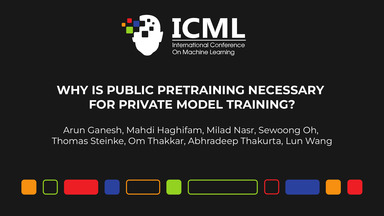Using Large Language Models to Simulate Multiple Humans and Replicate Human Subject Studies
Jul 24, 2023
Speakers
Adam Tauman Kalai
Sprecher:in · 0 Follower:innen
Rosa I. Arriaga
Sprecher:in · 0 Follower:innen
About
We introduce a new type of test, called a Turing Experiment (TE), for evaluating how well a language model, such as GPT-3, can simulate different aspects of human behavior. Unlike the Turing Test, which involves simulating a single arbitrary individual, a TE requires simulating a representative sample of participants in human subject research. We give TEs that attempt to replicate well-established findings in prior studies. We design a methodology for simulating TEs and illustrate its use to compare how well different language models are able to reproduce classic economic, psycholinguistic, and social psychology experiments: *Ultimatum Game*, *Garden Path Sentences*, *Milgram Shock Experiment*, and *Wisdom of Crowds*. In the first three TEs, the existing findings were replicated using recent models, while the last TE reveals a "hyper-accuracy distortion"' present in some language models.We introduce a new type of test, called a Turing Experiment (TE), for evaluating how well a language model, such as GPT-3, can simulate different aspects of human behavior. Unlike the Turing Test, which involves simulating a single arbitrary individual, a TE requires simulating a representative sample of participants in human subject research. We give TEs that attempt to replicate well-established findings in prior studies. We design a methodology for simulating TEs and illustrate its use to com…
Like the format? Trust SlidesLive to capture your next event!
Professional recording and live streaming, delivered globally.
Sharing
Recommended Videos
Presentations on similar topic, category or speaker
Tuning Language Models as Training Data Generators for Augmentation-Enhanced Few-Shot Learning
Später ansehen
Yu Meng, …
Tensor Decompositions Meet Control Theory: Learning General Mixtures of Linear Dynamical Systems
Später ansehen
Allen Liu, …
Why Is Public Pretraining Necessary for Private Model Training?
Später ansehen
Arun Ganesh, …
Self-supervised Neural Factor Analysis for Disentangle Speech Representations
Später ansehen
RSC: Accelerating Graph Neural Networks Training via Randomized Sparse Computations
Später ansehen
Zirui Liu, …





